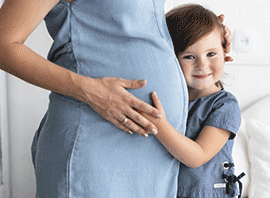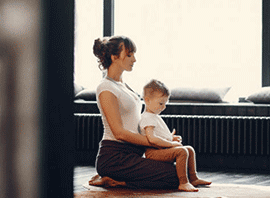Will I need more time to recover from c-sections than from vaginal birth? Are there any precautions to look out for?
You may be wondering about those questions if you’ve planned a cesarean or just came out of your cesarean surgery. The answer is yes, c-section is a major surgery that can bring a lot of stress physically and mentally. You would generally need more time to recover than you need to recover from a vaginal delivery. So now comes the BIG question: How can I speed up the recovery process? Find out more from the ultimate guide below.
#1 Always Leave Time for Rest
Rest can sound like mission impossible when you have a newborn in the house who’s constantly in need of attention and care. Newborns have irregular sleep schedules and many mums lose sleep over waking up multiple times at night to feed and care for your little one. However, resting is an important part of your recovery from any surgery. To speed up your recovery, you should always rest when your baby rests. Asking your partner, family, or friends to help you with house chores or babysitting can also help immensely.
#2 Take Good Care of Your Body
Keep in mind that you still have an incision wound on your belly that’s waiting to be healed. Be extra careful when you move your body to get on/off the bed, go up/down the stairs, or walk around the house. Try to limit the frequency of you getting up and lying down or sitting down again to avoid straining your wound. Hold your abdomen gently when you sneeze or cough to protect the incision from stretching. You can also use a belly band for stabilizing your wound and place your abdominal muscles back to shape. Depending on your condition, it can take up to 8 weeks to return back to your active routine. Remember to follow up with your doctor about your condition and ask beforehand for permission if you can start doing light work, drive, exercise, use tampons, or have sex.
#3 It’s Okay to Take Painkillers
There’s really no need to struggle with your pains when you still have so many other things to deal with. Don’t worry about taking the painkillers your doctor prescribes for you, most painkillers will not pose any harm on your baby during breastfeeding. You can also use heating pads to help relieve the pain and soreness at the surgical site.


#4 Drink Lots of Water, Eat Lots of Veggie and Fruit
Constipation can often occur after childbirth due to hormonal changes, sore abdominal muscles, and if you spend a lot of time lying down or sitting down. For some mums who’ve already had constipation before pregnancy, the condition can be worse and sometimes even painful. Try not to push too hard on your abdominal muscles to avoid straining your wound and accidentally injuring it further. Remember to drink plenty of water and ask your doctor for a stool softener if the condition is really serious. Eat lots of fiber and vitamin-rich foods, like vegetables and fruits, to help prevent and improve constipation.
#5 Get Emotional Support
Leaping into motherhood can be very difficult and mentally stressful. The transition to parenthood happens overnight, which can be overwhelming for first-time mums, especially those who’ve experienced cesarean births. If your c-section isn’t planned but happened over an emergency, the whole surgical experience can be very traumatic considering how your birth plan may have been completely ruined. Those negative feelings can overshadow the joy of bringing your baby to life and some mums may become confused by the complicated mixture of feelings and trigger feelings such as guilt and shame. If you’re feeling overwhelmed, talk to your partner, your friends and family, or consult a therapist for advice. Early emotional support can help reduce the risk of developing postpartum depression.


When Should You See a Doctor?
If you are suffering from any of the following conditions, you should contact your doctor immediately:
- Severe cramping in your uterus or abdomen
- You feel pain when urinating
- You have a fever or headache
- Your wound looks infected, red, swollen, and painful
- Your vaginal discharge has an abnormal smell or colour
- Vaginal bleeding level doesn’t decrease
- You feel nauseous, faint, your heart beats too fast or you feel like vomiting
- Swelling or redness in your leg
- You feel difficulty breathing
- Chest pain or pain in your breasts
Finally, every mum’s experience with the surgery is different, you shouldn’t compare yourself to others and worry about recovering slower than expected. Pay attention to your condition and follow up regularly with your doctor to heal in the most effective way. Stay brave, mummies!
If you haven’t read our other articles about c-section, check them out here:
Everything You Need to Know About C-Sections: Do You Need One?
Can I Breastfeed After C-section? 5 Common Questions Answered


















Validate your login
Sign In
Create New Account